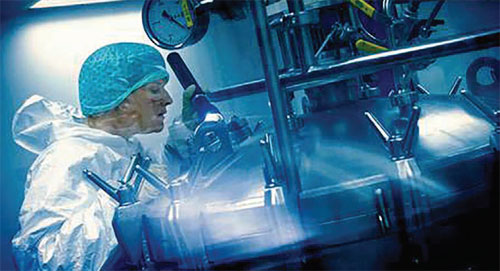By John Rogers
Two commonly used antibiotics will be the first products to be produced and marketed by Civica Rx, the generic drug company started last year by a consortium of hospitals, including Utah’s Intermountain Healthcare. Civica has inked a five-year deal with Copenhagen-based Xellia Pharmaceuticals to produce the broad-spectrum antibiotics vancomycin and daptomycin and expects the drugs to be available to Civica Rx’s member hospitals by the end of the summer.{mprestriction ids="1,3"}
Civica has committed to partnering with suppliers to deliver 12 additional essential generic medications by the end of the year.
Civica Rx was announced in January 2018 with the intent of shaking up the generic medication industry and resolving problems associated with shortages and high costs of essential medications. Intermountain Healthcare was a leader in the formation of Civica in association with hospitals and medical providers across the United States. Intermountain’s Dan Liljenquist is the new company’s chairman of the board. Civica opened its national headquarters in Lehi last month. The University of Utah’s health system is a partner member of Civica.
Vancomycin and daptomycin were among drugs at the top of a list of about 30 different priority drugs identified by member hospitals, according to Civica Rx’s CEO Martin VanTrieste. Knowing they couldn’t create all the drugs at once, they organized them into Tier 1 through Tier 3 priorities, he said. VanTrieste was vice president at Amgen Pharmaceutical in Thousand Oaks, California, before becoming CEO at Civica.
“Vancomycin was the No. 1 drug in the Tier 1 list. Vancomycin is a very broad-spectrum antibiotic used to treat very, very aggressive bacterial infections where other antibiotics might not be effective,” VanTrieste said. “The health systems were concerned that ‘Vanco’ was sporadically available to the patients.”
The announcement was cheered by member hospitals such as Providence St. Joseph Health System (PSJH), which has been impacted by intermittent shortages, in particular, of vancomycin, Dr. Amy Compton-Phillips told the medical website Fierce Healthcare. Compton-Phillips is the PSJH’s executive vice president and chief clinical officer. “It’s like not having milk in your fridge. You can figure out a workaround. But it’s frustrating.”
“Vancomycin is kind of the typical shortage drug because it’s generic and it’s an injectable and it’s critically needed,” Erin Fox, a pharmacist who studies drug shortages at University of Utah Health, told NPR. “But we just haven’t had a very good routine supply of it for a while now.” Fox recently joined Civica Rx’s advisory board.
Xellia already produces its own active pharmaceutical ingredients as well as finished injectable drug products for serious and often life-threatening bacterial and fungal infections, and is expanding its manufacturing and sales capabilities within the U.S.
“We are honored to work with Civica, an innovator in addressing generic drug shortages,” Carl-Aake Carlsson, CEO of Xellia, said in a statement. “Our collaboration also supports Xellia’s long-term ambition of mitigating anti-infective drug shortages across the U.S.”
When Civica Rx identified Xellia as its target partner, Xellia was more than happy to discuss a deal with Civica because Civica will open access to the hospital purchasers for Xellia, Carlsson said. In fact, it was Xellia that suggested expanding the deal to include daptomycin. Other priorities the hospitals have identified include local anesthetics, pain management medications, cardiac drugs and IV nutritional products, Fierce Healthcare reported.
“What makes this attractive to suppliers like Xellia is that, because of the way contracts are awarded over time, you have one or two manufacturers supplying most of the market,” VanTrieste said. “Players like Xellia don’t have access to all of the customers just because of the way pharma companies try to negotiate the contracts to get the most volume possible so they can be the most efficient in their operations. Companies like Xellia that are late to the game are locked out a little bit.”
To help ensure competition in the market, VanTrieste said, member health systems were asked to provide Civica Rx with half of their annual volume so they will continue purchasing from other manufacturers. “We believe at the end of the day, the more manufacturers making a product, the better options you have around the quality of the product, you have a more robust supply chain and it usually comes at the most affordable prices.”
Because Xellia is already a Food and Drug Administration-approved supplier, Civica Rx will have a shorter approval process to bring the products to market and is already building the products in Civica manufacturing locations.
“We are negotiating with a bunch of other suppliers to do the same thing that we did with Xellia in a partnership arrangement,” said VanTrieste. “At the same time, we’re looking at how to buy or build our own manufacturing facilities. We’re already in those discussions with those individuals.”{/mprestriction}








